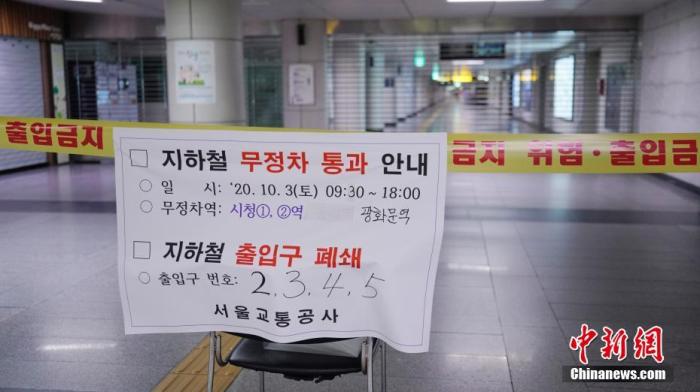China News Service, Seoul, October 3 (Reporter Zeng Nai) A number of private organizations in South Korea held a "drive-through" rally on the 3rd. Seoul mobilized a large number of police forces to prevent the epidemic.
On the same day, some conservative groups drove vehicles through Gwanghwamun Square and other places. Signs and horns were posted on the vehicles to protest the Moon Jae-in government.
To prevent people from gathering to cause infection, the police set up checkpoints on 90 roads in the city.
On October 3, a number of South Korean civil organizations launched a “drive-through” rally, and Seoul mobilized a large number of police forces to prevent the epidemic.
The picture shows a large number of policemen and police cars near Gwanghwamun Square in Seoul, and many road sections are under traffic control.
Photo by China News Agency reporter Zeng Nai
The reporter saw in the center of Seoul that a large number of police forces had enclosed the vicinity of Gwanghwamun Square. There were hundreds of police cars parked on a few kilometers from the city hall to Gwanghwamun. There were many fences on the sidewalk, and it was forbidden. In and out, many subway stations such as City Hall Station are closed.
The police all wore face masks and masks.
In August of this year, due to a large-scale rally held by individual groups in Gwanghwamun, it caused serious mass infections and aggravated the rebound of the epidemic.
Subsequently, Seoul City banned gatherings of more than 10 people.
However, many conservative groups in South Korea demanded to meet again on October 3rd, the Open Day of South Korea's public holiday.
On October 3, a number of private groups in South Korea launched a “drive-through” rally. Seoul mobilized a large number of police forces to prevent the epidemic and many subway stations were closed.
The picture shows the notice "No stop at this station" posted outside the subway station of City Hall Station.
Photo by China News Agency reporter Zeng Nai
The South Korean court recently rejected the conservative group's request to hold large-scale gatherings, but allowed "drive-through" gatherings, required compliance with the rules for gatherings of less than 10 vehicles, and prohibited windows.
South Korean Prime Minister Ding Shijun said on the same day that illegal assemblies that hinder the fight against the epidemic will be dealt with on the principle of "zero tolerance".
According to the South Korean Central Anti-epidemic Countermeasures Headquarters, in the past 24 hours, South Korea has newly confirmed 75 cases and a total of 24,027 confirmed cases.
(Finish)

